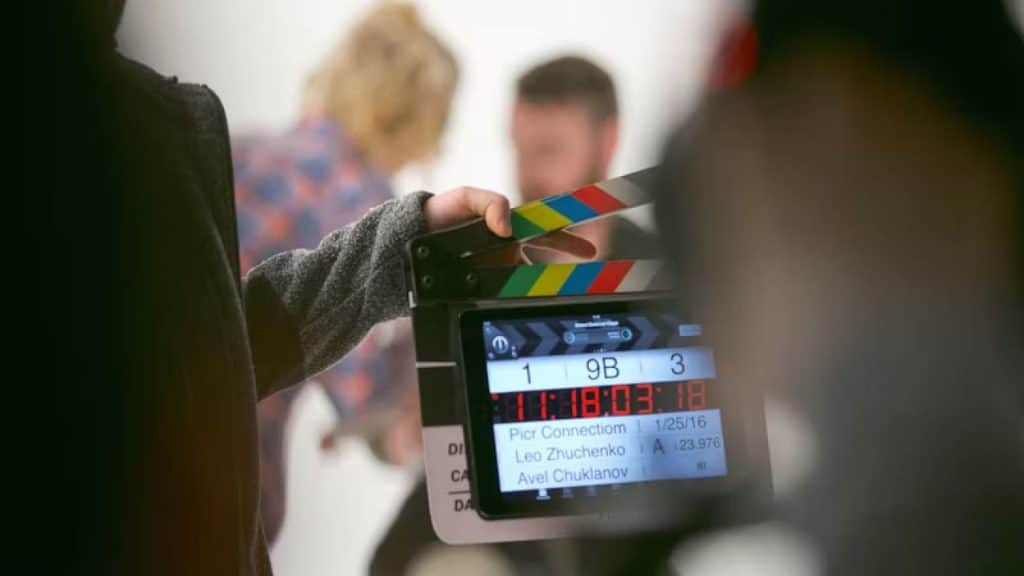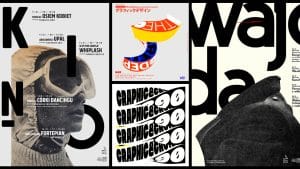Film Careers: Exploring Career Paths in the Film Industry

Imagine a career where creativity and skill take center stage. You’re part of a team that inspires and captivates audiences worldwide daily. That’s the film industry. Dynamic and fast-paced, it encompasses cinema, television, and the ever-expanding world of online streaming. From cinema to streaming, film’s impact on popular culture spans the globe.
If this sounds like something you’d want to be a part of, find out more in this comprehensive guide to film careers, from directing to producing, screenwriting, and more. Learn the steps to break into the industry by gaining the necessary skills and experience to build a portfolio and stand out in this competitive field. First, ease into it by learning more about the industry.
IN THIS GUIDE:
Understanding the Film Industry
Understanding the Film Industry
A red carpet at an awards show or a film premiere may be exciting events to look forward to, but they are the culmination of years of work. Film careers go far beyond glitz and glamour. The hundreds of professionals it takes to make a film can be surprising to those new to the business, with people working as camera assistants, audio engineers, editors, sound designers, and much more. Each of these professionals is essential to the process, which is why the industry is one of the most collaborative in the world.
Today, film isn’t limited to movies and television. Filmmakers can venture into digital marketing, branded content, social media, and event videos. Film is now within the reach of the everyday storyteller, as evidenced by the number of YouTubers and video content creators.
Structure and Hierarchy in Film Production
Behind every commercial audiovisual project is a vast collaborative team of creative professionals following a hierarchy of roles to bring a vision to life. How many roles each person takes on depends on the budget for a project. A small production might have an art director and a lead actress in one, while big-budget feature films will have a single person working full-time on continuity supervision or a role such as armorer, should the film require it.
No matter the scale, each role, from producer to sound technician, is vital to crafting the final product and requires the ability to work harmoniously with others. Aspiring filmmakers who understand the importance of each department’s role in the production hierarchy will be better prepared to find their place in this intricate, rewarding industry.
Let’s go through some roles in production that could interest you as a new career.
Exploring Different Career Paths in Film
Think of a film project as a business. Several specialized departments are working together to achieve a common goal. In most commercial businesses, that goal is selling a product or service; in a film project, you produce a video or a movie.
You have the lighting team, led by the gaffer, who works with the Director of Photography to create a mood or tone for every scene. Set design, costume, and makeup match that mood or tone, ensuring that visual details give viewers the feel of the story’s time and place. Let’s explore these and more of the most vital film careers for the production of a film, in hierarchical order:
Directing and Producing
Directors are the CEOs of productions, working closely with every department and guiding cast and crew to set the tone of a script and bring it to life. They are everything-people, working on storyboards, camera angles, numerous rehearsals, and beyond. If the project fails, that often falls on the director’s shoulders.
Producers are a driving force behind the scenes, the engine responsible for planning, financing, and timeline. While the director gets creative freedom, the producer has to stay grounded to manage schedules, stay on budget, coordinate departments, and make critical decisions. This job requires a balance of creative passion for storytelling and business acumen.
Together, Directors and Producers manage the challenges of a large project, responding with quick thinking and flexibility. Film producers and directors address many challenges to keep the project on course. The reward for their months of unforgiving hours and stress is the creation of a meaningful piece that reflects everyone’s hard work and vision. Regardless of the position you want to pursue, aspiring filmmakers must understand these leadership, communication, and problem-solving roles.
Screenwriting and Storyboarding
Nearly every film project starts at the desk of a creative who writes a script, often years before it ever sees the light of day. Screenwriters are the architects of a story, envisioning scenes before a single set is built or an actor is cast. Into this structure, they add dialogue, characters, and plotlines to convey an authentic human experience through something as simple as words.
After the screenwriter completes a script, storyboarders translate it into visuals for directors and cinematographers. Each shot is envisioned and illustrated as frames outlining critical scenes, angles, and actions. Before the cameras start rolling, storyboards give the film crew a shared vision to maintain consistency and natural flow in the larger narrative.
Both of these roles demand storytelling and pacing skills to bring scenes to life. Learning to master the art of translating stories into powerful visuals takes you closer to confidently making an engaging film that every department can work on.
Cinematography and Film Editing
Now, let’s go into cinematography. Cinematographers are the directors of photography (DoPs). They take the director’s pointers on aesthetics and carefully craft shots accordingly, using their knowledge of lighting, angles, lens selection, and framing to control every shot’s emotional impact.
Editors work after the cameras turn off, selecting and assembling footage to both follow the script and enhance the narrative by building tension and creating an engaging rhythm that puts viewers on the edge of their seats. With film editing, raw footage turns into a real film.
Cinematographers and editors combine technical skills with a creative eye. While cinematographers understand camera and lighting mechanics, editors must work with software and have a sense of timing and pacing.
Sound and Music Production
Camera work gets a lot of attention, but sound and music production give films the immersive quality that can turn a silly scene into a tear-jerker or vice versa. Skilled sound designers and composers use their technical and creative training to realize the director’s vision.
With good music, viewers are drawn into the story visually and emotionally. Scores, soundtracks, and other compositions sometimes take on a life of their own, becoming recognizable to the general public, such as the music of Star Wars, Indiana Jones, and other famous movie themes.
Other sound production can be as simple as foley artists creating ambient noise and sound that the microphones on set can’t pick up, such as heels clicking or leaves crunching. It’s also responsible for the clarity of voices and dialogue, which, together with the rest of the audio, makes things sound as natural as if they were real life.
Art and Production Design
The sets, props, costumes, and makeup of film production can transform a set from a regular space into a thriving environment alive with stories. Production designers oversee film design, making decisions on sets, colors, and styles and establishing the look and feel of a visual project. Production design includes art directors, production designers, set builders, prop masters, costume designers, and many more of the most creative people you’ll ever meet.
If you’re interested in recreating period pieces, sci-fi settings, or any other immersive world, consider a career in art and production design. Juggle the project’s creative needs with logistics and budget while achieving a masterpiece of the fantastic or a rollicking rom-com.
Acting and Stunt Work
Now, for the roles that people most often think about when they hear “film industry”: the actors and stunt workers. The script, art direction, sound design, camerawork, and everything else come alive thanks to the emotional performance of the actors. These performers need talent, dedication, and deep emotional intelligence to understand and convey a character’s motivations.
Stunt workers must have a very different skill set. Physically, they must be fit and flexible, able to handle high-risk scenes with a fearless approach. They often have backgrounds in martial arts, gymnastics, high-speed driving, and other skills to execute stunts that the script requires but actors can’t safely perform. The physical intensity a stunt actor provides a film adds to the verisimilitude, upping the ante with a carefully choreographed fight or a daring car chase.
Some actors do their own stunts, but both actors and stunt performers add great value to many films’ success. As an actor or stunt double, you’ll want to be in touch with your emotional and physical intelligence and capable of immersing yourself in a story.
Non-Traditional Jobs for People With Filmmaking Skills
Although all the aforementioned jobs make up a huge part of Hollywood movies and filmmaking worldwide, filmmaking skills are in high demand across digital media, advertising, and many other industries. Have you ever seen an in-flight safety video? Someone was working on the sound design to produce those instructions — as well as script-writing, voice acting, editing, and all the other roles the movies require.
If you have a knack for storytelling, videography roles can include social media content producer, brand videographer, and virtual reality (VR) content creator. To perform these roles, technical training courses can teach how to plan, shoot, and edit videos. Additionally, you may leverage a marketing background to understand engagement, platforms, and other elements that make videos engaging and dynamic.
You don’t have to choose between corporate and creative roles, either. Make stunning wedding videos or shoot comedic shorts for social media or web shorts for your own business. You could even forgo the production aspects and get into writing film criticism.
Skills and Qualifications for Film Industry Careers
A successful career in film or digital media requires a blend of technical expertise and interpersonal skills. Here are the vital skills for aspiring professionals.
Education and Training
Programs in media production and film studies can help you pursue a profession in the industry. Learn technical skills, film history, and storytelling at an online institution like Sessions College, which caters to students at every level. From learning theory to getting practical experience to build a portfolio, you’ll get professional feedback and learn about the challenges you’ll face in the real world.
In addition, these technical and soft skills provide a strong foundation for various film and digital media roles, preparing professionals to contribute meaningfully to the creative process.
Essential Soft Skills
- Communication: Clear communication is vital in every film role, as film projects rely on teams working together to achieve a unified vision.
- Creativity and Innovation: The ability to think outside the box and find unique solutions contributes to the originality and impact of a film.
- Teamwork and Collaboration: Film is a collaborative art form, so working well with others and supporting a shared goal is essential.
- Problem-Solving: Adaptability ensures effective responses to production challenges.
- Attention to Detail: Precision is crucial, whether in editing, sound design, or set decoration, as the most minor details can significantly affect the audience’s experience.
Technical Skills
- Camera Operation: Mastering the mechanics of different camera types and understanding framing, exposure, and movement are critical for roles in cinematography and videography.
- Editing Software Proficiency: Familiarity with industry-standard software like Adobe Premiere Pro, Final Cut Pro, and After Effects is essential for editing and post-production roles.
- Sound Design: Sound design skills, from recording to editing, deepen a film’s atmosphere.
- Lighting Techniques: Knowing how to manipulate light helps set the tone and mood for each scene, making this a fundamental skill for cinematographers and gaffers.
- Scriptwriting and Storyboarding: Crafting compelling stories and translating them into visual outlines requires strong writing skills and an understanding of narrative pacing.
- Project Management: Larger projects require coordinating between departments, budgeting, and scheduling—critical skills for producers and assistant directors.
Starting Your Career in Film
For those passionate about storytelling, creativity, and collaboration, the film industry offers endless avenues to explore, from traditional filmmaking to roles in the emerging fields of digital media and content creation. The industry’s vast range means there’s a place for everyone, whether you’re interested in working behind the scenes, directing, editing, or creating video content for brands.
With the right skills, your film career can take off. By building a foundation in the essential technical and soft skills, you can enter the film industry prepared to make your mark. Education platforms like Sessions.edu offer project-based learning in film and media, helping you gain hands-on experience that sets you apart in a competitive landscape.
Ready to turn your passion into a career? Explore film-related courses at Sessions College and start your journey toward a future in filmmaking today.

Ximena Restrepo is a freelance writer and marketer native in Latin American Spanish and North American English. She's worked as a writer for travel blogs, a content marketer for a baby tech company in Taiwan, and an SEO agency in the UK. Read more articles by Ximena.
ENROLL IN AN ONLINE PROGRAM AT SESSIONS COLLEGE:
























